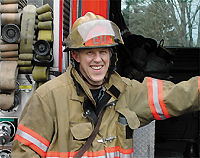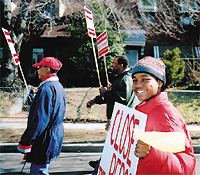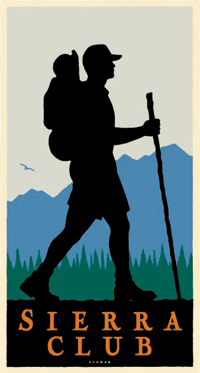|
by Sarah Wootton
The Right Place at the Right Time
 "Mr. President, we do not need to drill the Arctic." That's how Ed Hall, a Portland, Ore., firefighter and Club member, greeted President George W. Bush in January. "Mr. President, we do not need to drill the Arctic." That's how Ed Hall, a Portland, Ore., firefighter and Club member, greeted President George W. Bush in January.
When Hall volunteered at Ground Zero in New York City, he never guessed it would lead to a face-to-face meeting with President Bush.
But Hall, who helped New York City firefighters dig through the Twin Towers rubble, was one of four local firefighters asked to greet Bush on the runway when the President visited Portland.
As he shook hands with Bush, Hall took advantage of his five seconds of face time with the President.
"...Telling [the President] not to drill in the Arctic ... was the shortest, most concise statement that could fit in the time I had, and it also is a top priority issue for the environmental community."
Apparently it was not what Bush expected to hear.
"He kept his composure, but in his eyes was something like, 'How did you get in here?'"
Hall doesn't expect to meet with a Republican president again anytime soon.
In Step in Washington
 With the help of Club environmental justice organizer Julie Eisenhardt, more than 100 residents of Washington, D.C.'s River Terrace neighborhood marched in support of closing a nearby oil-burning power plant and trash transfer station. A recent health study indicated that the facilities were responsible for the high asthma and cancer rates in the neighborhood; one of every two kids has asthma. The neighbors are pushing for a federal scientific health study that will make a compelling case for plant closure. With the help of Club environmental justice organizer Julie Eisenhardt, more than 100 residents of Washington, D.C.'s River Terrace neighborhood marched in support of closing a nearby oil-burning power plant and trash transfer station. A recent health study indicated that the facilities were responsible for the high asthma and cancer rates in the neighborhood; one of every two kids has asthma. The neighbors are pushing for a federal scientific health study that will make a compelling case for plant closure.
Bears Repeating
The Wyoming Department of Game and Fish didn't count on Wyoming Chapter member Janet Maxwell when it opened a public comment period on its draft management plan for the grizzly bear. (Wyoming is one of five states that must come up with a management plan for the bear when it loses its status as a threatened species, expected to happen in five to 10 years.)
Worried that the plan did not provide enough protection for the bear outside its recovery area, Maxwell wrote a letter urging Game and Fish to provide better safeguards. But she didn't stop there. She headed to Yellowstone National Park with two tables, a van and six colleagues and met thousands of visitors, encouraging many of them to sign comments asking for better protections for the grizzly. At the end of the month, thanks to Maxwell's efforts, the Wyoming Chapter hand-delivered 6,000 signed comments to Game and Fish; 97 percent of the comments the state received favored more protections.
Regardless, Game and Fish ordered an independent poll of 1,500 Wyoming citizens to determine whether the conservationist comments truly reflected the state's majority. Poll results showed that 76 percent wanted greater protections. Another draft with improved grizzly protections should be out in February.
Graphically Speaking
 When not designing the official graphic for the Salt Lake City Olympic Winter Games, graphic artist Michael Schwab might be seen at the Sierra Club headquarters in San Francisco. Well, maybe not the award-winning artist himself, but the limited-edition, silk-screened print of the hiker (seen here) he designed for the Club. When not designing the official graphic for the Salt Lake City Olympic Winter Games, graphic artist Michael Schwab might be seen at the Sierra Club headquarters in San Francisco. Well, maybe not the award-winning artist himself, but the limited-edition, silk-screened print of the hiker (seen here) he designed for the Club.
Schwab, who lives in Marin County, counts Apple, The National Parks, Sundance, the San Francisco Opera - and now the Club - among his clients.
Schwab donated 120 signed and numbered prints to the Club, five of which were auctioned off as part of eBay's Sept. 11 Auction for America fundraiser. The remaining copies are available for sale in the Club's store. Find out more.
Jump on a Bus, Gus
A weather inversion arrived in Salt Lake City just in time to disappoint many visitors in town for the winter Olympics -- the spectacular Wasatch Mountains that tower over the city can't be seen and there is a brown haze as far as the eye can see.
"It's been like this for a week," says Marc Heileson of the Sierra Club's Southwest office. "There's a warning out that people over 65 shouldn't be outside."
In a state where the 30-year transportation plan calls for highways over rail at a 5 to 1 ratio, cleaning up Salt Lake City's air is an uphill battle. To promote public transit and ultimately clear the air of pollution, the Utah Chapter is posting more than 50 billboards and busboards on light rail trains, city buses and along the city's busy streets.
Perhaps the signs -- and the Olympic haze -- will convince Utahns to "hack" away at the state's pollution by using public transportation more often.
Honors in Order
Vicky Husband, Conservation Chair for the British Columbia Chapter, knows that you don't have to compete in the Olympics to win medals. A lifelong volunteer, Husband is one of Canada's most active and well-known environmentalists, and in January, she was awarded the Order of Canada, the country's most illustrious award.
The award, which honors 136 citizens each year, follows on the heels of the Order of British Columbia that Husband received in 2000.
Husband, who helped establish the Clayoquot Sound U.N. Biosphere Reserve and Khutzeymateen Grizzly Bear Sanctuary, was given the award largely thanks to her "tireless" work to protect British Columbia's natural heritage, particularly coastal rainforests.
Photo of EJ activists courtesy Julie Eisenhardt
Up to Top
|